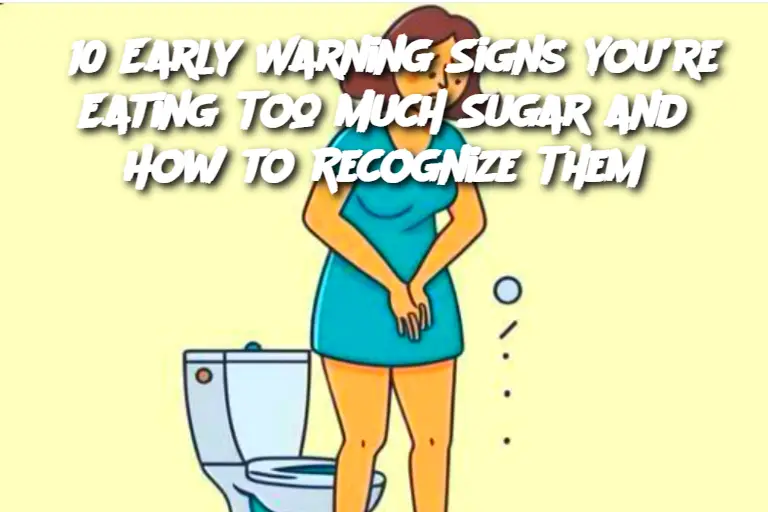ADVERTISEMENT
Introduction
Sugar is a common ingredient in many of the foods we consume daily, from sweet treats to seemingly healthy snacks. However, consuming too much sugar can have a significant impact on your health. While the occasional indulgence is perfectly fine, excessive sugar intake can lead to a variety of warning signs that you may be overdoing it. Recognizing these early signs can help you make healthier choices before more serious issues arise. Here are 10 early warning signs that you might be eating too much sugar and what to do about it.
1. Cravings for Sweet Foods
If you constantly find yourself craving sugary snacks or drinks, this could be a sign that your body is becoming dependent on sugar. The more sugar you consume, the more you might feel the need to have it regularly.
2. Fatigue or Energy Slumps
While sugar provides a quick burst of energy, it often leads to a crash shortly after. If you feel fatigued or sluggish, especially after consuming sugary foods, it could be a sign that your blood sugar levels are spiking and crashing.
3. Difficulty Concentrating
Sugar can affect your brain function, making it harder to concentrate or focus. This is especially true if you’re consuming sugary foods in excess, as your brain may experience fluctuations in energy, causing problems with attention and cognitive function.
4. Increased Hunger
Excessive sugar can cause fluctuations in insulin levels, leading to increased hunger and cravings. This can lead to overeating or snacking more frequently, further contributing to weight gain and poor dietary habits.
5. Skin Breakouts or Acne
High sugar intake can contribute to acne and other skin issues. Sugar spikes cause inflammation, which can lead to clogged pores and breakouts. If you notice an increase in skin problems, it might be time to evaluate your sugar consumption.
6. Mood Swings
Frequent sugar consumption can lead to rapid fluctuations in blood sugar levels, which can impact your mood. If you notice you're feeling irritable, anxious, or even experiencing feelings of depression, your sugar intake might be contributing to these emotional shifts.
7. Weight Gain
Sugar, especially refined sugars, can contribute to weight gain by increasing your calorie intake without providing essential nutrients. If you’ve been gaining weight despite a balanced diet, your sugar consumption might be playing a role.
8. Poor Sleep
Excessive sugar consumption, especially late in the day, can interfere with your sleep cycle. Sugar can increase the release of adrenaline and cortisol, which can make it harder for you to wind down and get a restful night’s sleep.
9. Digestive Issues
Consuming too much sugar can upset your gut health by encouraging the growth of harmful bacteria and yeast. This imbalance can lead to bloating, gas, and other digestive discomforts.
10. Frequent Headaches
Fluctuating blood sugar levels can trigger headaches. If you experience frequent headaches, it may be due to your sugar intake causing your blood sugar to spike and then drop sharply, leading to discomfort and pain.
Ingredients:
While this isn't a recipe in the traditional sense, here are some ingredients to look out for when reducing sugar intake:
Natural sweeteners (such as honey, maple syrup, or stevia)
Whole fruits (to satisfy sweet cravings with fiber and nutrients)
High-fiber foods (to stabilize blood sugar levels)
Healthy fats (such as nuts, seeds, and avocados)
Lean proteins (to reduce cravings and keep you full)
Instructions for Reducing Sugar Intake:
Read Labels: Always check the nutritional labels of packaged foods for hidden sugars. Look for terms like sucrose, high fructose corn syrup, and agave syrup, all of which indicate sugar content.
Substitute with Healthier Alternatives: If you’re craving sweetness, opt for whole fruits or natural sweeteners like stevia or monk fruit. These can provide a touch of sweetness without the same negative impact as refined sugars.
Increase Fiber Intake: Foods high in fiber help regulate blood sugar levels and keep you full longer. Incorporate more whole grains, vegetables, and legumes into your meals.
Stay Hydrated: Drink plenty of water throughout the day to help manage sugar cravings and maintain energy levels.
Eat Balanced Meals: Ensure your meals include a healthy balance of protein, fats, and carbohydrates to prevent blood sugar spikes and crashes.
Serving and Storage Tips:
Serving Tip: If you feel the need to have a sweet treat, try serving fruit with a dollop of Greek yogurt or a sprinkle of cinnamon. These can satisfy your craving without a sugar overload.
Storage Tip: Keep healthy snacks like nuts, seeds, and fresh fruit on hand to avoid reaching for sugary options when you're hungry between meals.
Variations:
ADVERTISEMENT
